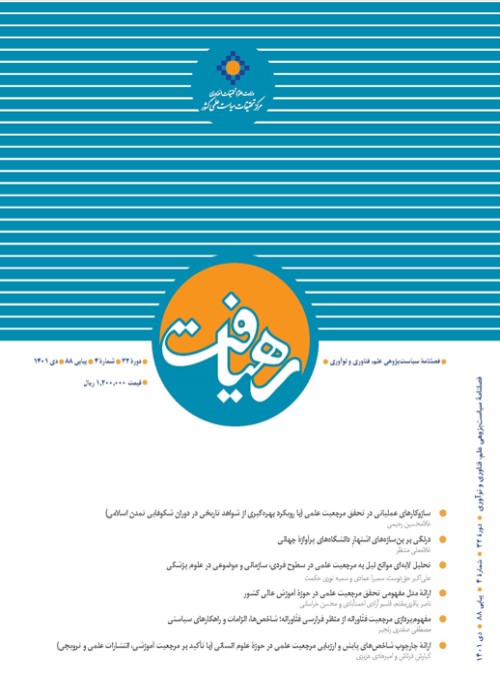Operational mechanisms in the realization of scientific authority (Approach of using historical evidence during the flourishing period of Islamic civilization)
Author(s):
Article Type:
Research/Original Article (دارای رتبه معتبر)
Abstract:
With the growth and development of human societies and their scientific (and technical) differences from each other, the discussion about which person or society is in charge of leading science and others are following it is raised. As a result, the discussion of leadership or "scientific leadership" is formed.During the history of human civilization, at least three great civilizations found a position of scientific authority: Greek civilization, Islamic civilization, and Western civilization. Iran excelled scientifically in two periods. Ancient period and Islamic period. After that, Iran stopped and did not progress in the scientific field; Or he was not in a position of leadership. From the 11th century to the end of the 13th Hijri, in many branches of natural science, a kind of retrogression can be seen. With the establishment of new universities, Iran got acquainted with new knowledge. At first slowly and then more quickly, Iran's role in the production of global science, as a follower partner, was gradually formed. In the last few decades, with the accelerated and widespread publication of the research results of Iranian university researchers, in the form of scientific articles, a kind of scientific self-belief emerged. Despite the amazing scientific progress of the last few decades, scientific education and research in most fields of knowledge are carried out with the examples provided by others. Such a situation puts Iran in the position of follower, student, and imitator. Now the discussion is about how to reach the position of leadership and competence in science and technology. This article inevitably raises the issue of scientific authority. In this article, according to the current state of science and technology in the country, an operational mechanism is proposed to achieve scientific leadership. For this purpose, historical evidence is used during the flourishing period of Islamic civilization. The study of the three leading civilizations led the author to the conclusion that the main reference factors of the mentioned civilizations are common.In any case, this article has based its analysis on using the experiences of Islamic civilization to achieve scientific authority. In connection with the scientific authority of Islamic civilization, two main questions are raised: A- Did Islamic civilization achieve scientific authority? B- If the answer is positive, what factors led to the achievement of scientific leadership? The answer to the article is positive by citing reasons and stating historical evidence. In addition, the main reason for choosing such an approach is that the old "knowledge" is part of the scientific and technical developments in the history of human civilization, with the proviso that it cannot be exploited directly. But the ancient scientific "character" that marked the flourishing of great civilizations, and the "tradition" that provided the foundation of civilization and scientific authority, can be designed and used. In this article, a part of the scientific character and tradition of the Islamic period, which played an effective role in its scientific authority, is introduced. The reason for proposing such a topic is that this legacy can be used to achieve scientific authority at present. By observing and searching, the author concluded that scientific authority is the result of the emergence and establishment of five main factors in society. These five factors of scientific authority are as follows: A- wisdom and knowledge, B- questioning and inquiry, C- pioneering, D- leadership, and E- stability and longevity. These factors are explained by mentioning historical evidence and some documents. In addition, it was emphasized that to achieve scientific authority in any society, reference-making foundations must be provided. In the article, four foundations of scientific reference were mentioned. They are as follows: A- leadership and governance of science; B- tolerance and social leniency; C- character and innovative traditions; and D- scientific governance. These foundations are also explained and analyzed by citing examples.It is clear that in the last three decades, a suitable platform has been created in Iran for scientific development, but a sufficient and solid foundation has not yet been provided to move toward scientific authority. The article emphasizes that the majority of the five principles have not yet been realized in Iranian society. Also, sometimes there is a huge gap between the current scientific situation and the position of scientific authority.Based on historical experiences and concerning the current state of science in Iran, things such as the main indicators of scientific authority, indicators related to being a model, and an operational mechanism to move towards scientific authority are suggested.In the last part of the article, the operational mechanism to achieve scientific authority is briefly suggested. For this purpose, some main indicators of scientific authority are introduced. National and institutional scale programs are suggested. Participating institutions are named to achieve scientific authority in the framework of the forward-looking national program. Special emphasis is placed on the main and important role of Iranian scientific academies in the issue of scientific authority.
Keywords:
Language:
Persian
Published:
Rahyaft Journal, Volume:32 Issue: 88, 2022
Pages:
3 to 18
magiran.com/p2662310
دانلود و مطالعه متن این مقاله با یکی از روشهای زیر امکان پذیر است:
اشتراک شخصی
با عضویت و پرداخت آنلاین حق اشتراک یکساله به مبلغ 1,390,000ريال میتوانید 70 عنوان مطلب دانلود کنید!
اشتراک سازمانی
به کتابخانه دانشگاه یا محل کار خود پیشنهاد کنید تا اشتراک سازمانی این پایگاه را برای دسترسی نامحدود همه کاربران به متن مطالب تهیه نمایند!
توجه!
- حق عضویت دریافتی صرف حمایت از نشریات عضو و نگهداری، تکمیل و توسعه مگیران میشود.
- پرداخت حق اشتراک و دانلود مقالات اجازه بازنشر آن در سایر رسانههای چاپی و دیجیتال را به کاربر نمیدهد.
In order to view content subscription is required
Personal subscription
Subscribe magiran.com for 70 € euros via PayPal and download 70 articles during a year.
Organization subscription
Please contact us to subscribe your university or library for unlimited access!


